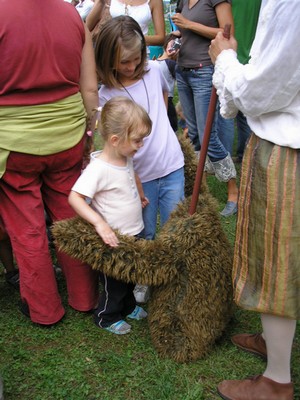 
The positive effect of fairy tales and puppets on children
The puppet and the child
The puppet is the child’s live friend. His personality develops as he plays with the puppet and his relationship with the outside world forms. He fills the puppets’ empty shells with his own imagination and forms the appearance of the puppets according to his developmental degrees. In the child’s mind there is no sharp dividing line between the real world and the world of imagination. To the child they are equal. In his mind possible and impossible interweave and become one. The unique magic of puppets is that they have the same properties and needs of the child himself. The curious thing is that puppets do not only effect children. They fascinate and attract adults as well.

Puppets have a strong impact on children. They are aware of the properties of the puppets, they know they are simple object and not alive. They know they can’t move or talk and they also know other people animate them. However, they fully experience all the situations that form around the puppets like they were real. Impossible become possible in front of the child’s eyes; the knight defeats the dragon, true love breaks the evil spell etc. It does not bother them at all. They repress the fact that the puppet is an object. The puppets’ words and everything that happens to them are a lot stronger than the puppeteer’s voice and movements. The little ones do not care what the puppets look like. They do not care if they can see the puppeteer on stage beside the puppet itself..
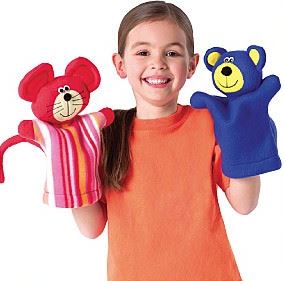
The existence of the screen and stage does not have anything to do with the child attributing life and emotions to the funny puppets moving on the puppeteer’s hands. All the child needs is that the life of the story’s heroes’ resemble his own life in some way. The teddy has to have a bath just like him. The kitten has to eat its dinner just like him. They firmly believe the puppets are alive for the duration of the performance and the events that happen before the screen are happening to them. This can clearly be witnessed when seeing the audience of a play; the children’s rapt attention, their behaviour, they shouts and communication with the actors.
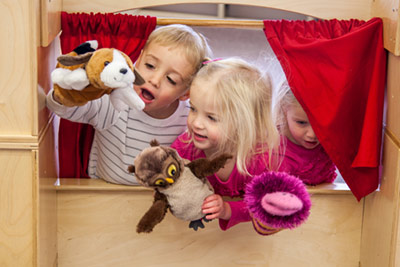
The short scenes answer the personal questions of the child’s everyday life. The longer plays adapt to the child’s widening view on life, they depict human properties, moral truths. The same puppet can offer different possibilities to explore; It can impersonate the little sister but if the child is angry with the little sister it can become a witch. The child reflects his impulses, anger towards siblings, parents, friends, his conflicts with these people on to the puppet. The healthy development of the child is more guaranteed if the child lives his fears, anger, conflict, doubts and insecurities through playing with the puppet rather than leaving it all to be trapped inside him like a weight on his shoulder. The child that plays with the puppet talks, but he talks for the puppet so it is easier for him to express his feelings. The puppet on his hand fights, but it is not him. The puppet uses angry words but he does not have to worry about being punished for them as it is not him saying these words. A good puppet play improves the child’s imagination, strengthens the durability of divided attention, memory and the process of thinking. It has great effect on speaking skills, it strengthens love, openness and bravery. It enriches the world of emotions, moral and aesthetic values.
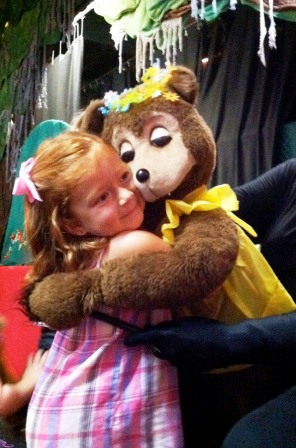
The effect of fairy tales on children
"If you don't know the trees you get lost in the woods but if you don't know fairy tales you get lost in life." (Siberian proverb)
The time of telling fairy tales is not up - fortunately. We have always needed fairy tales and we always will because everyone needs magic, thrill, the experience of living in a dream. Stories are also extremely important and crucial for the development of a child, as they help with imagination, vocabulary. The child can experience various life situations through stories and ease the built up inner tension with them.

The growing up child needs to be able to understand simple human connections and relations, sympathise with the heroes and recognise the baddies.Putting himself in the heroes' shoes he lives through danger, escape, happiness and sorrow, takes part in adventures, fights for the truth and gets rewarded for his bravery or misdoing. Ethical morals get fixed in the little ones' brains this way - indirectly.

Stories don't simply entertain, they take a huge part in education as well: they teach you about life, provide emotional handles and help develop personality.
The child is the most preoccupied by stories that are entertaining and that tickle his interests. But he can only get real gain from a fairy tale if the story develops his intellect, starts off his imagination, provides guidance in his emotions, helps him reconcile with his fears and hopes and suggests solutions. Out of all the stories in children's literature folk stories meet the above criteria the most.
The key to a good story is that it exerts influence on the child's current real emotional level.
The examples show the child that there is temporary or permanent solution to his serious issues. In the fairy tales (like in real life) one cannot avoid problems; fights, battles are essential parts of life.
Fairy tales always have a happy ending, if the hero picks up the fight and confronts the unrighteous he can overcome any obstacles.

Folk stories always draw up existential problems briefly and easily, therefore the child faces the essence of the issue whereas a more complicated storyline would only confuse him.
Fairy tales simplify things.
It draws its figures with defined lines, it only focuses on the most important details. Its figures are not very unique as individuals; they represent characters.
Unlike in many modern stories in folk stories evil is just as much portrayed as good.
Good and bad take shape in a character in almost every story and manifest in its actions, just as in real life good and bad are both present in everyone. This duality causes the ethical problem for the solution of which one has to fight.
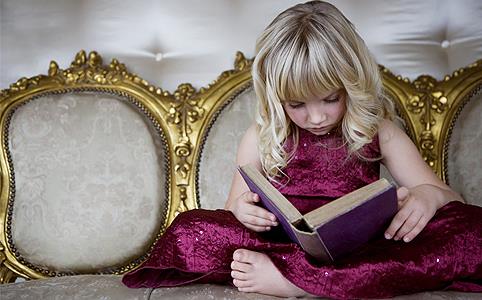
The attractiveness of evil represents itself in stories too, this is what the dragon, the power of the witch's magic symbolises, often temporarily taking the place of the hero, but at the end of the story good always wins and evil has to suffer.

In the fairy tales what discourages sin is not fear but the confidence in the fact it is not worth it.
Moral consciousness is gained through the heroes’ personal charm and charisma, not the final victory of the good. The child identifies himself with the hero and his journey in the story and he lives out the hero’s struggles, battles and he enjoys his victory eventually.
Identification is initiated by the child himself and the hero’s internal and external battles help him form his moral values.
The figures in stories are not ambivalent, they are not good and bad at the same time. Fairy tales are ruled by the same extremity as children’s thinking. Everyone is either bad or good, there is no transition. One of the siblings is smart, one is simple- minded, one sister is diligent and friendly, the other is lazy and mean… However, the contrasting of opposite characters does not highlight the importance of the right behaviour, as we see in educational stories.
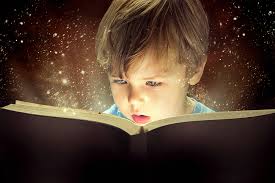
With the help of complicated life-like characters children would not be able to understand the difference between right or wrong as well as through extreme characters.
We have to wait with the transition between good and bad until a somewhat stable personality develops in the child on the grounds of positive identification. Once that happened the child will be able to understand the huge differences between people and that everyone has a choice as to what they want to become.
The child does not chose between good or bad, instead he bases his preference on who gets his sympathy or antipathy. The less complicated and more easier the character is to understand the easier it is for the child to identify himself with or distance him from them.
The child does not identify himself with a figure based on their good character but because he is drawn to their situation and the role they play.
He does not have the question “Do I want to be good?” in his mind, instead he asks himself “Who do I want to be like?”. To answer this question he will identify himself with the character and live out their adventures. If this character is a positive one, he decides he wants to be good too.

This kind of contrasting between good and bad is not present in amoral fables. Heroes of these stories do not develop the child’s personality by making him choose between good and bad but by giving him the hope that even the weakest can do well in life.
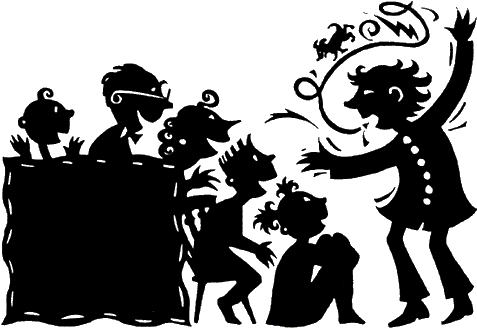
Fairy tales are the only literary genre that guides the child as to how to discover his identity, how to find his place in life. Fairy tales suggest that happy and fulfilling life can be achieved by anyone but only if they don’t shy away from confrontation as true identity can only be found through hard times as well as good.Tales promise that if you start off on this rocky and scary road good powers will guide, help you and you will achieve your goal in the end. But they also warn you that the cowards and defeatists who are afraid to discover their identity will face a bleak life- if something more serious does not happen to them.

High percentage of children of our modern age is disadvantaged- they are deprived of even the possibility of discovering fairy tales. They mainly meet a simplified and poor version of fables that have no deeper meaning or message at all- such as film and television adaptations that offer superficial entertainment.
Studies by Piaget show that a child’s thinking stays animistic until puberty. Although parents and teachers say objects have no feelings and are not capable of movement, and the child pretends to believe this- as he tries to meet the expectations and he does not want to seem ridiculous- deep in his heart he feels differently.
Rational teaching makes him bury this “real knowledge” inside him very deep where rationality cannot reach but fairytales could still enrich and shape his personality from.

In the oedipal stage and before that too (approximately up to 3-6 years of age) the child sees the world rather chaotic. As in most of us there are conflicting emotions in the child all the time and although the adult has learnt how to integrate these emotions the child does not yet know how to battle with them, he has no idea what to do with ambivalent emotions. He sees mixed emotions like love and hate, excitement and fear incomprehensible and chaotic. He is not able to see himself good and well behaved but naughty and defiant at the same time even if he really is. As he cannot understand the transition stages he sees everything as entirely black or entirely white. A man is either brave or a coward; the happiest man on Earth or the most unfortunate; the most attractive or the ugliest; the smartest or the dumbest; he either loves or hates there are no emotions in between. This is how fairytales portrait life.

The blemishes of modern tales highlight the essential ingredients of the traditional fairytales. Tolkien identifies the necessary elements of a good tale as fantasy, healing, escape and comfort; the hero heals from utter desperation, escapes a huge danger but the most important thing of all is solace. When Tolkien mentions that every real tale has to have a good ending he stresses there has to be a “sudden and good turn” in every story. No matter how awful and hard the adventure was the adult or child audience have been reading about, when the “turn” happens the reader gasps, their hearts start to beat faster and- although they are close to tears- they are suddenly overcome by a huge feeling of joy.
Mária Domány: The magic of puppet play
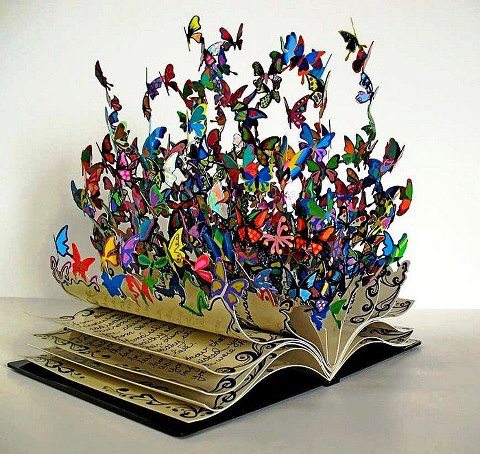

| 
